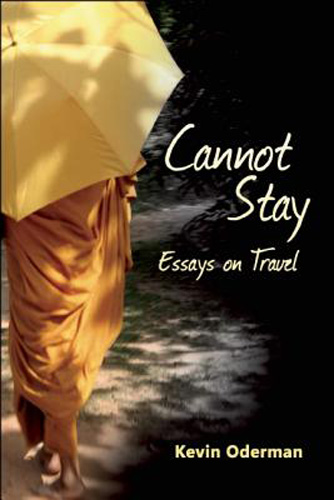Cannot Stay
In these eleven essays that make up Cannot Stay: Essays on Travel, Kevin Oderman journeys widely: from Latvia to Italy to Turkey; from Indonesia to Cambodia to Vietnam. Oderman does not feign to completely absorb the cultures in which he travels. Who could in a week or a month? No, he does something better; he delves into an aspect or a couple aspects of a culture or its history. These aspects—whether a painting, a dance, a temple, a house, or a puppets show—he describes so intricately that, while I read, his obsessions became my obsessions, and, when I finished, I remembered my own obsessions, and was inspired to explore them with the same kind of passion and precision. In these eleven essays that make up Cannot Stay: Essays on Travel, Kevin Oderman journeys widely: from Latvia to Italy to Turkey; from Indonesia to Cambodia to Vietnam. Oderman does not feign to completely absorb the cultures in which he travels. Who could in a week or a month? No, he does something better; he delves into an aspect or a couple aspects of a culture or its history. These aspects—whether a painting, a dance, a temple, a house, or a puppets show—he describes so intricately that, while I read, his obsessions became my obsessions, and, when I finished, I remembered my own obsessions, and was inspired to explore them with the same kind of passion and precision.
Some of my favorite essays are “Waiting for the Bombs,” “Judith and Harold,” “Time to Kill: Cambodia,” and “A House Fitting.” In the first, Oderman travels in Southeast Asia immediately after September 11th. While America begins retaliation against Afghanistan, he remembers the repercussions of America’s involvement in Vietnam. The second contains a meticulous and expansive look at a painting, Botticelli’s Judith’s Return to Bethulia. In the third, he travels to Cambodia, where the beauty of Khmer sculptures and Angkor Wat exists alongside deformed landscapes and people that even a seasoned traveler such as Oderman can’t exorcise from his mind and dreams. The last details Oderman’s quest to have a house measured for his own particular body size and shape, a traditional Balinese practice.
When I studied under Oderman, he demanded that his students cut extraneous words. Unsurprisingly, he holds his own writing to the same standard. Each sentence is chiseled, each paragraph clear. While reading, I gained the impression that Oderman knew infinitely more about each topic but chose to reveal only relevant insights and facts. He has sifted and resifted the wheat from the chaff. Especially in this age of information and oversharing, such weighing seems refreshing and rare.
Despite the reticent tone, these essays provide an arch of autobiographical details from Oderman’s birth to death. In the first essay, he muses on the “accident of our birth,” noting that he “was a baby brought home to a white ranch house in a blue blanket in Portland, Oregon”; East Timor masks and a Bali cremation prompt him to reflect on his futile childhood desire for his facial expression to match his inner self; in “Colors,” he recounts the women with whom he’s traveled; babies in Florentine paintings, reminiscent of a baby in a Raymond Carver story, launch an inside joke between him and his wife; and in the last essay, “Trips Not Taken,” he imagines his own death. “There’s nothing like traveling alone to call the past up close,” he writes.
The title of the collection comes from the song “The Long Road” by Eddie Vedder. Oderman uses it in the essay “Of Corse” to explain why tourists flock to new shops: because old buildings are reminders that “we cannot stay.” Although Oderman mentions his own careful shopping, he “prefer[s] the experience to the sell,” and, resisting the cult of the modern and homogeneous, returns, again and again, usually walking, to old objects or places or spaces. His words that praise the Church of the Holy Spirit in Tallinn in the essay “White Amber” are fitting to praise his own book:
I want to use the term somber as term of praise. And serious. And quiet. A place for the small, honest voices to be heard, of conscience, of simple recognition, and of welcome. Nothing for show, no reaching, not even for heaven. There is room here for sorrow, that good sadness we can’t resist and really live.
If you are a reader who takes pleasure in precise language, who desires to read deeply on aspects of a culture, and/or who admires somber, serious, and quiet atmospheres, you will enjoy these essays.





